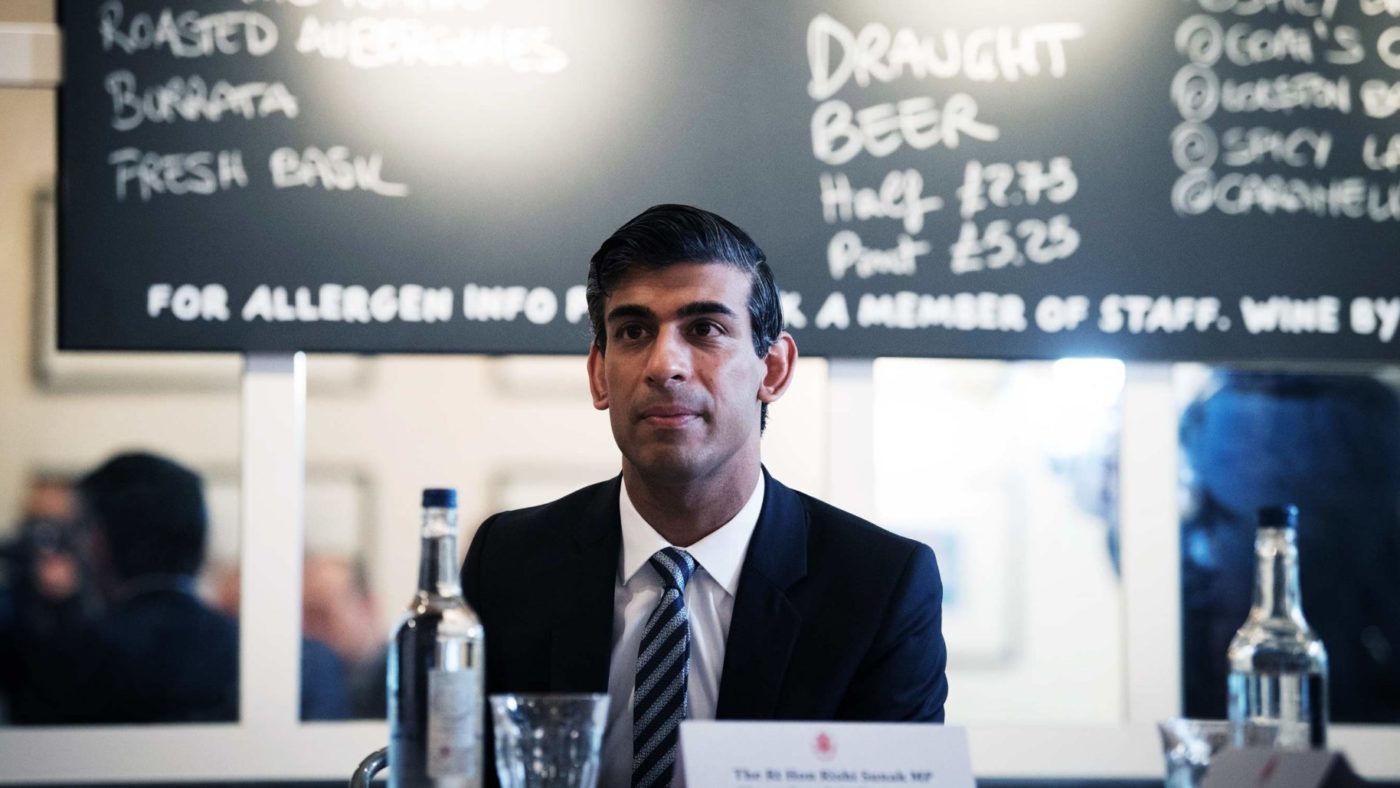During the summer, Rishi Sunak seemed like perhaps the only popular politician in the country. After months of lockdown, the Chancellor was not only saying it was possible to finally have some kind of fun – he was also offering to foot half the bill for a meal out.
Not only had Sunak’s Treasury helped keep people afloat in lockdown through the furlough scheme and boosting Universal Credit, with Eat Out To Help Out he was even giving a little treat on top. Months later, though, the smiling, unmasked photo of Sunak handing out two meals during the summer lands a little differently.
Not only does encouraging the nation to gather indoors and eat now feel like folly, but Sunak’s track record feels far less steady than it once did. It’s true that the Treasury – like the rest of the Government – had to do numerous difficult tasks at previously unimaginable speed to get any kind of response to the pandemic in place. But to join the top of government is to sign up for the difficult jobs. And as we come to assess how 2020 went so catastrophically wrong, the Chancellor and his department must rank among the culpable.
The real problem with the Treasury response to coronavirus was not Eat Out To Help Out – it was less obvious but far more widespread. The reality is that the department was guilty of a failure of imagination.
The UK is the fifth biggest economy in the world, and last year was reckoning with a crisis on a scale not matched by anything since World War II. But after the initial fiscal ‘bazooka’ of the furlough scheme, the Treasury too often acted as if Britain was a medium-sized manufacturing business, desperately worrying about its debt and cash flow.
Boris Johnson and his Number 10 operation have faced criticism for repeatedly acting slowly and indecisively, with delayed lockdowns leading to more disruption, greater restrictions, and more deaths. But multiple sources say that on virtually every occasion the department pushing hardest against restrictions was the Treasury.
Locked in the spreadsheet mindset it has long been notorious for, the Treasury constantly raised the economic costs of each lockdown or variant of tier restrictions. Similarly, it encouraged optimistic talk and the maximum level of opening up whenever possible. This bid to save a few billion here and there ended up costing tens of billions, because the Treasury appeared obsessed with accountancy – leading it to fail on the economics.
Where businesses needed certainty and predictability, the Government’s approach delivered neither, with its seesaw habit of opening too much, then closing at short notice, doing far more damage than predictable, earlier restrictions would have.
After all, it’s relatively simple for a pub to plan for a two-week closure in three weeks’ time. It is impossible for it to manage day-to-day when it doesn’t know if it can open or not tomorrow. These difficulties are compounded for theatres, where productions take weeks of costly rehearsals, design and preparations.
This failure to provide certainty didn’t just apply at the margins: the Government repeatedly tried to prematurely wind down the furlough scheme, leading to some workers being made redundant just days before the Government then extended it, causing needless heartache in the process.
Statutory sick pay was also kept far too low, even we desperately needed sick people to stay at home. What funding there was for self-isolation was also too low and excluded anyone told to self-isolate via the app, because of Treasury concerns about fraud – another example of accounting overriding economics.
Compensation for self-employed workers has similarly bounced chaotically around – and left out around three million workers – providing yet further sources of economic uncertainty and anxiety. At a time when the cost of borrowing was as low as it has ever been and with an overwhelming political consensus in favour of spending, the Treasury consistently tried to save the odd billion here and there, each time costing the broader economy (and thus its future revenue) far more.
This isn’t a matter of left or right-wing ideology, but of a fundamental misunderstanding. By buying into the false dichotomy that the policy choice facing the Government was protecting the economy versus protecting the people, the Treasury forgot that the economy is the people – and thus led to failure on both fronts, giving the UK one of the worst death tolls per capita in the world, as well as the largest economic hit of any OECD country.
Politicians’ short-term ratings often differ drastically from their long-term legacy. As it stands, Sunak remains one of the most popular ministers in the Cabinet – but that rating is largely undeserved. Indeed, history will show that under his command the Treasury made a series of eminently avoidable mistakes, and wasted money and lives by doing so.
If they want to do better, before the public notices quite how badly things went wrong last year, it will mean doing something no-one has managed to get the Treasury to do for a long time – use their imagination. And maybe even listen to some economists.
Click here to subscribe to our daily briefing – the best pieces from CapX and across the web.
CapX depends on the generosity of its readers. If you value what we do, please consider making a donation.


